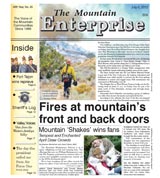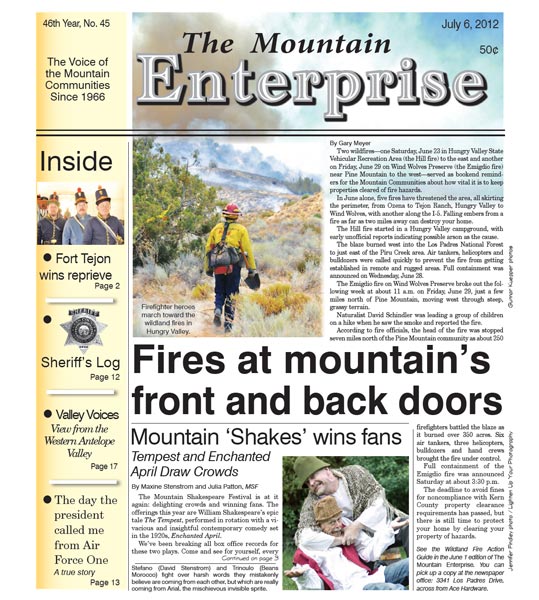![Vernon Oickle of Nova Scotia in Washington with the ISWNE Golden Quill Award, won for writing about the behind the scenes dealings of his local school board in its effort to hide decisions about school closures from public process. [Hedlund photo]](https://mountainenterprise.com/fds/images/story/fs_10505.jpg)
Vernon Oickle of Nova Scotia in Washington with the ISWNE Golden Quill Award, won for writing about the behind the scenes dealings of his local school board in its effort to hide decisions about school closures from public process. [Hedlund photo]
Supporting grassroots democracy was also the centerpiece for a conference I attended in June and July with news editors from English-speaking nations around the world—from Australia, England, Scotland, Ireland, Canada and all the states of the U.S.
I was honored to receive a scholarship and the opportunity to meet face to face with this community of independent local news editors. I asked our publisher to join me at the conference.
The premier award of the event, the “Golden Quill” was won by an editor from Nova Scotia (a Canadian island just north of the coast of Maine). We were amazed at the subject of his prize-winning editorials. They could have come from the pages of our own newspaper.
Over the past few months we have been alerting the community to the reluctance of the superintendent and most the board of our El Tejon Unified School District (ETUSD) to debate in public the critical issues surrounding likely closure of at least one ETUSD campus next year.
Last year Vernon Oickle, editor of The Lunenburg County Progress Bulletin— 3,000 miles away from here and in another country— was reporting about his local school board’s actions to avoid the public process for consolidating schools. The board held illegal private meetings to avoid public scrutiny of this urgent community concern.
His newspaper used Canadian freedom of information act and public record requests to reveal what was going on. Last December, Nova Scotia’s Minister of Education fired all 12 members of the South Shore Regional School Board.
Julian Calvert of Glasgow, Scotland had a similar story to tell. He explained how his newspaper’s reporting helped hold local officials accountable, which resulted in a revised policy for rural school closures.
In February of this year we wrote an editorial about our ETUSD school board’s illegal meeting of February 1, 2012 to consider laying off half of the teachers at Frazier Mountain High School— including the whole English and social studies staffs—with no apparent plan in place for how ETUSD planned to meet its educational mission under state of California laws.
We presented a letter to the ETUSD board, asking them to pass a resolution not to hold further illegal meetings. For three months they ignored our letter, and the request to acknowledge to the public that they would not continue such conduct. Their attorney advised them to hold a token “make good” meeting in public, at which nothing of substance was discussed as they voted on the same issue again. Three months later, in the teachers’ appeals hearing, the superintendent told a judge that the high school might close! Such an idea had never been brought up before our public as a serious possibility.
The facts and the reasoning have not been presented to our community in a respectful way.
Is there a transcontinental conspiracy of school officials who wish to abuse the public trust? That is unlikely.
But then, what can account for the similarity in behaviors among those who oversee schools in three different nations at a time when economic downturn and changing demographics mandate tough choices on school closures?
Is it cowardice? Evil intent? A desire to avoid the messy inefficiency of public dialogue? Is it arrogance in ramrodding a personal agenda? Or is it simply human nature to try to avoid conflict at any cost?
During eight years of reporting the school district beat—and in over 45 years of reporting by The Mountain Enterprise—we’ve seen a little bit of all of those traits in play.
This summer, ETUSD trustees are poised to choose where to consolidate the 7th through 12th grades in our district. It appears they hope to vote on the matter before four new trustees are elected in November.
What do you think? Should this issue be debated as part of the election campaign? Or should it be decided by the veteran members of the current outgoing board? Should the campus remaining open be El Tejon School or Frazier Mountain High School? Why? We’d like to hear your thoughts on this.
We will share your letters and relevant facts in these pages.
After all, we are all patriots to our own hometown, and to our own children. There is no question about what we believe in. We believe in access to quality education for our children, and in public participation in decisions that transform our communities.
This is part of the July 06, 2012 online edition of The Mountain Enterprise.
Have an opinion on this matter? We'd like to hear from you.


